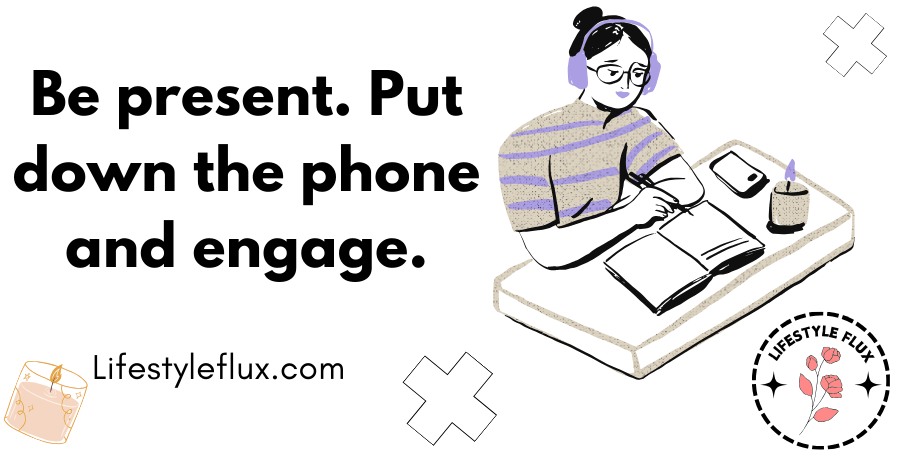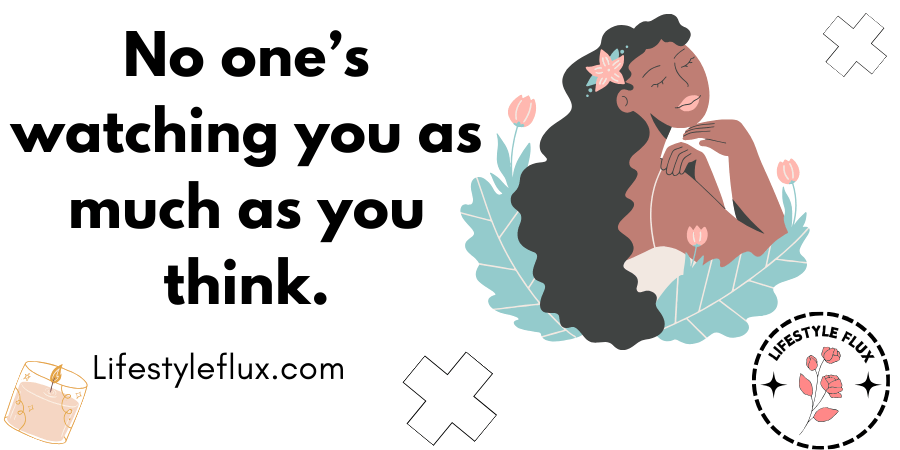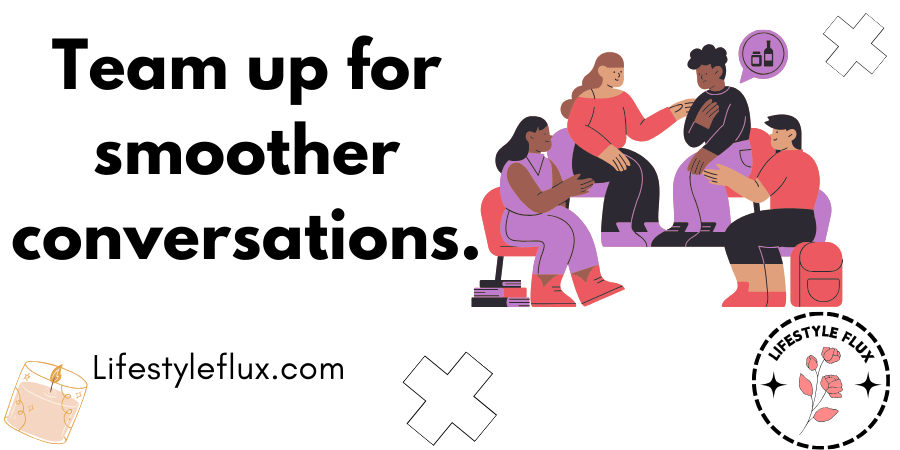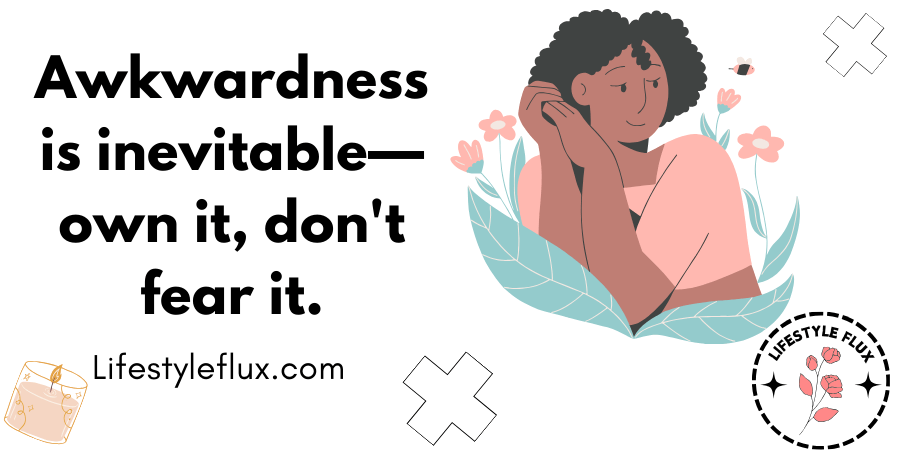Feeling socially awkward is something we’ve all experienced at one time or another. Whether missing a handshake or telling a joke that falls flat, these uncomfortable moments can make us feel isolated and self-conscious.
But here’s the good news: Being socially awkward isn’t permanent. With the right attitude and a few simple steps, you can turn awkward moments into opportunities for real connections.
In this article, I will provide four practical steps to help you embrace your uniqueness, reduce your social anxiety, and increase your confidence in social interactions.
Table of Contents
1. Accepting the Inevitable
Awkwardness is a part of life; there’s just no way around it. No matter how confident, driven, or sociable you are. You’ll still run into your fair share of awkward moments. You’ll accidentally miss a handshake.
Oops, you’ll wave at someone who’s not waving at you. Oh, you’ll tell a joke that no one laughs at—mm-hmm.
These moments are uncomfortable and annoying But they’re inevitable. Accepting that inevitability is your first step toward becoming less socially awkward. In other words, you can own your awkwardness to create less of it yeah, I know it sounds backward.
But let me explain: most people aren’t socially awkward because they’re doing awkward things—they just think they are.
They’re hyper-aware of every potentially awkward thing they do, but it’s actually their reaction that makes people uncomfortable.
Even if awkwardness is inevitable, there are ways to turn a weird moment into a fun one. Let’s say you’re telling a story about something dumb that you did at work. You get a few laughs, But notice an extended silence afterward.
If you’re socially awkward, you might assume the worst; you take this awkward silence as a sign that you have terrible social skills.
Now you start to think that you aren’t funny, you assume no one likes you, and you blow these awkward moments.
It’s so far out of proportion that you can never recover because you’re scared of making things awkward again. You decide to play it safe, you stop acting like yourself, and your fear of awkwardness ends up ruining your chances of connecting with the people around you.
But social awkwardness isn’t a unique disease that you only suffer from. No, it isn’t a strange feeling that no one has ever felt before. No decent person is going to dislike you for making things awkward because they’ve done the same thing plenty of times themselves.
Like, who hasn’t held the door open for someone who was too far away or heard their waiters say enjoy your meal, and you replied Thanks you too. These goofy moments often turn into funny stories. But only if you react the right way, people who are socially awkward tend to make one of two mistakes.
When something uncomfortable happens, they either underact or overact. Underacting is when you mute or muffle your personality; you don’t like yourself. Because you’re worried people won’t accept who you really are. Instead, you stay quiet and self-contained.
Sure, you won’t make the most memorable impression, but at least you won’t make things weird, right? Wrong. When you underact, everyone around you will feel like you don’t want to be there, even though you’re just trying to be cautious.
People will assume you’re annoyed, sad, or bored, and that just makes things super awkward for everyone. On the flip side, overacting is when you try to be something that you’re not; you might want people to think you’re cool, likable, or outgoing.
You cover up your real personality with a fake one, thinking it will make you less awkward. But that isn’t how it works mm-hmm it isn’t hard to tell when someone’s putting on an act people can and will see right through you.
You’ll end up missing out, on potential connections because you were too busy maintaining your mask.
So, what should you do instead? Instead of trying to avoid the awkwardness, learn how to make the best of it. A simple and effective way to diffuse an awkward moment is to laugh at yourself. Never try to play off your mistake like it didn’t happen.
You shouldn’t be scared to be a little self-deprecating. You want to show others that you don’t mind messing up.
And that you’re also okay with doing something dumb every once in a while and at the end of the day. Your best friends are the people you feel comfortable being awkward around.
2. Consistent Activity
Many socially awkward people spend way too much time in their own heads. They overthink each and every word they say; they overanalyze every little thing people do. They go back and forth, wondering if they’ve made a new friend or ruined everything.
These mental gymnastics distract you from the most important part of being social. Forming bonds, you may have a hard time connecting because you’re paying too much attention to yourself.
Let’s say a new friend tells you a story about how they went hiking in the mountains. Were you actually listening, or were you trying to think of something cool to say?

When they were done, oftentimes, you were trying so hard to control your awkwardness that you didn’t relate to it. The people around you are telling you a personal story; this person was trying to connect with you. They made an attempt to invest in the relationship normally, this is a perfect opportunity for you to do the same thing.
If you’re too concentrated on yourself people will think you aren’t interested so, how exactly do you show someone that you’re present? Well, you start by getting off your phone.
Socially awkward people tend to use their phones like shields, whenever they feel an uncomfortable moment coming on.
They hide behind texts or social media looking at your phone might seem like a great way, to avoid that awkward silence. But it does more harm than good now, I know this sounds obvious but countless people don’t realize how their phone is impacting their friendships.
The simple truth is it puts people off. It makes them feel like you’re intentionally stepping away from the conversation. Why should they bother caring if you don’t? People appreciate that when you fight through awkward moments with them, it might be embarrassing.
But it’s one of the best ways to build stronger bonds.
Now that you’ve put your phone away show them that you’re present by finding ways to relate. If they say something you agree with, tell them why when they divulge an embarrassing story, go ahead and spill one of your own. Even if they say something you don’t understand, you can relate by asking them for more information.
There are tons of ways to show that you’re present, but they all revolve around one thing: staying active in the conversation. No matter how awkward you are, people need to know that you’re trying.
3. The Spotlight Effect
If you’re socially awkward, you may think people are paying more attention to you than they actually are. You might feel like you’re always under a spotlight when you look around the room.
Does it seem like people scrutinizing everything you do? This is a common psychological phenomenon called the spotlight effect.
Since you’re used to overanalyzing yourself, you assume everyone else is doing the same thing. Imagine you spill a drink on your pants, and you immediately decide you look ridiculous.
So, you spend the whole night going out of your way to cover it up; you try so hard to make sure no one sees. But 99% of the time, no one would even notice, and even if they did, they wouldn’t think twice about it. Each and every person has their own complicated life to worry about. Psychologists call this theory of mind.

It’s our ability to attribute unique thoughts and beliefs to the billions of other people in the world. We actually learn this when we’re toddlers, but it’s incredibly easy to forget, especially when we’re feeling insecure. The truth is everyone else is just as worried about being awkward, looking their best, and making a good impression.
You’re obsessing about your pants, the girl next to you might be paranoid about a rip in her sleeve, and the guy in the corner might be hiding the mole on his arm.
My point is that no one worries about what you do as much as you do. So, don’t be scared to make connections be yourself, and live your life like no one’s watching. Because most of the time no one is.
4. Social Tag-Teaming
Even if you feel more comfortable being social it’s hard to meet new people to practice with. Now, in theory, starting up a conversation should be simple you walk up say hi, and ask how their night going.
Boom! You’ve got a conversation. But in reality, it’s never that easy, right? You may know how to hold a conversation, but that doesn’t mean you’re an expert at starting them.
This is where an outgoing teammate comes in handy. You want to bring along someone who can smooth over that initial rough patch. Let them handle the awkward introductions while you slip in once the conversation gets interesting.

The trick is to find one thing to latch on to. You might chime in with a funny ending to your friend’s story, or maybe you can ask the other person a question about something they said.
Not only is that a natural entrance, but it also gives people something to relate to, right? Off the bat, hey, don’t worry about inserting yourself where you don’t belong. Using a teammate essentially gives you an excuse to enter any conversation they do.
Just make sure you’re not hiding in their shadow; it’s easy to let a more outgoing friend do all the talking. But what does that accomplish? They’ll be making new friends while you’re just along for the ride.
So, make sure you’re always involved in the conversation. Your friend might be handling most of the small talk.
However, you can still make an impression as an individual by looking for ways to connect specifically with other people besides your friend. For example, if someone mentions one of your interests, go ahead and tell them that you’re passionate about these same things.
This makes you relatable and memorable outside of your friends. Now, of course, you won’t need your teammate forever; this technique is great to learn.
But eventually, you should tackle the introduction on your own.
But don’t worry, the more you do it, the easier it gets. Once you’ve spoken to enough people, you’ll realize they aren’t nearly as scary as they seem.
Conclusion:
Social awkwardness is a universal experience, but it doesn’t have to control your life.
By accepting your awkward moments, staying present, managing the spotlight effect, and practicing social tag-teaming, you can navigate social situations more easily and confidently.
Remember, everyone has their awkward moments, and they don’t define who you are. The key for you is to embrace them, laugh them off, and keep pushing forward.
Practicing self-expression will help you realize that being yourself is the most effective way to create genuine connections with others.

Founder and CEO of Lifestyleflux.com, I bring years of expertise in self-improvement, wellness, and personal development to help you lead a happier, more balanced life. Through practical insights, eBooks, and consultations, I share actionable strategies rooted in experience and a passion for empowering others to unlock their full potential.

